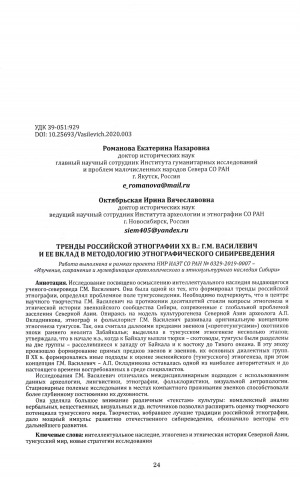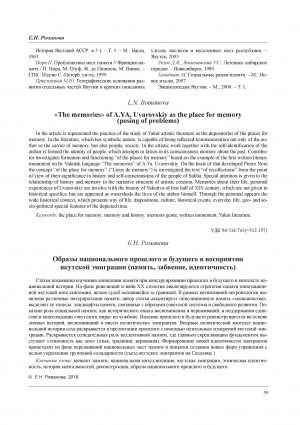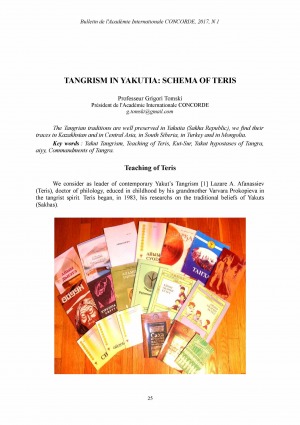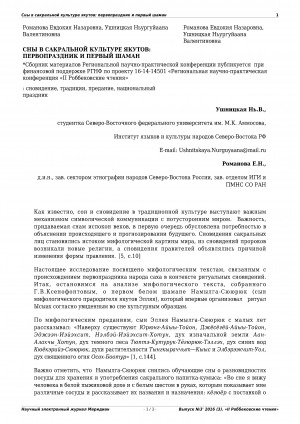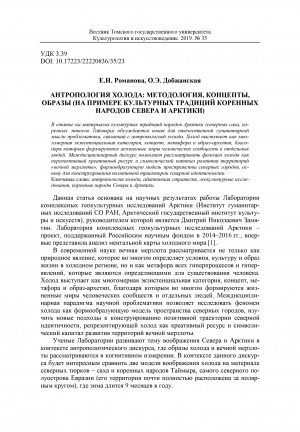Место работы автора, адрес/электронная почта: Институт гуманитарных исследований и проблем малочисленных народов Севера, Отдел археологии и этнографии ; 677027, г. Якутск, ул. Петровского, 1 ; e-mail: e_romanova@mail.ru ; http://igi.ysn.ru/
Ученая степень, ученое звание: д-р ист. наук
Область научных интересов: Этническая история, этнография, культурная антропология.
ID Автора: SPIN-код: 4987-0431, РИНЦ AuthorID: 73609
Деятельность: С 2001 г. является руководителем Центра этнологических исследований ИГИ АН РС(Я).
Количество страниц: 7 с.
- Василевич Глафира Макарьевна > О жизни и деятельности Г.М. Василевич,
- Общественные науки. Образование > Этнография. Обычаи. Жизнь народа. Нравы,
- НАУКА ЯКУТИИ > ОБЩЕСТВЕННЫЕ НАУКИ > Этнография. Обычаи. Жизнь народа. Нравы,
- КНИГАКАН > Общественные науки > Этнография. Обычаи. Жизнь народа. Нравы. Фольклор.
The research is devoted to under standing the intellectual heritage of the outstanding Northern scientist G. M. Vasilevich. She was one of those who shaped the trends of Russian Ethnography and defined the problem field of Tungusic studies. It should be emphasized that the focus of G.M. Vasilevich’s scientific work for decades has been on the issues of ethnogenesis and ethnic history of the Evenk community of Siberia, which are associated with the global problem of settlement in North Asia. Based on the model of cultural genesis of North Asia by archaeologist A. P. Okladnikov, ethnographer and folklorist G.M. Vasilevich developed the original concept of the ethnogenesis of the Tungus. So, it is believed the ancestors of the Evenks (the "prototungus”) she identified several stages in the Tungusic ethnogenesis; claimed that at the beginning of the AD, when the Turki - pastoralists came to lake Baikal, the Tungus were divided into two groups - settled to the West of lake Baikal and to the East to the Pacific Ocean. During this era, the direct ancestors of the Evens and Evenks, their main dialect groups, were formed. G.M. Vasilyevich’s research was distinguished by an interdisciplinary approach using data from archeology, linguistics, ethnography, folklore studies, and visual anthropology. Stationary field research in places of compact residence of Evenks contributed to to reveal the psychomental world of Tunguska society. She paid great attention to various "texts” of culture: a comprehensive analysis of verbal, material, visual and field sources allowed us to expand the spatial and cultural boundaries of the Tungus world and consider the ethno-genesis of the Evenks in the mode of time extension, similarly, in the XXth century, other approaches to the assessment of the Evenk (Tungus) ethno-genesis were formed, while the concept of G.M. Vasilevich - A. P. Okladnikov remained one of the most authoritative and still in demand among specialists in Tungusic studies. Her work, which incorporated the best traditions of the St. Petersburg school of Ethnography, gave a powerful impetus to the development of Russian Siberian studies, outlined the vectors of his further development.
Романова, Е. Н.
Тренды российской этнографии XX в.: Г. М. Василевич и ее вклад в методологию этнографического сибиреведения / Романова Е. Н., Октябрьская И. В. ; Институт гуманитарных исследований и проблем малочисленных народов Севера СО РАН, Институт археологии и этнографии СО РАН // Народы и культуры Северной Азии в контексте научного наследия Г. М. Василевич : сборник научных статей / ответственный редактор Л. И. Миссонова ; редакционная коллегия: А. Н. Варламов, Н. И. Данилова, Е. Г. Маклашова [и др.] ; рецензенты: Т. В. Аргунова, Т. Г. Басангова, В. Н. Давыдов ; ответственный за выпуск М. П. Дьяконова. - Якутск : ИГИиПМНС СО РАН, 2020. - С. 24-30. - DOI: 10.25693/Vasilevich.2020.003
DOI: 10.25693/Vasilevich.2020.003
Количество страниц: 16 с.
Romanova, Ekaterina N. "Les gens qui s’endorment pour l’hiver". Étudedu chronotope mythopoétique : vers uneanthropologie du froid / Ekaterina Romanova, Oksana Dobzanskaya ; Institut des sciences humaines et des études autochtones de la Branches ibériennede l’Académie des sciences de Russie, Laboratoire d’études géoculturelles intégrées del ’Arctique // Géocultures : méthodolo gies russessur l'arctique / редактор Daniel Сhartier, переводчик Marianna Samsonova, фотографии Robert Fréchette ; École supérieure d'études urbaine, Institut des sciences humaines et des étudesautochtones de la Branche sibérienne del'Académie des sciences de Russie, Institut d'information scientifique sur les sciences humaines de l'Académie des Sciences de la Russie. - Montréal : Imaginaire-Nord, 2020. - 106 с. - (Isberg). - С. 69-84.
Количество страниц: 7 с.
This article is devoted to the study of memory concepts in the designing of the past and the future in the context of national history. Against the backdrop of revolution and war are analyzed memory and strategy of the Yakut intellectual elite - opposition of Soviet government at time who found themselves abroad by the will of fate. In the framework of cognitive anthropology revealed different interpretations of memory, the author emphasizes the opposition to the memory of "minorities" makes them toposes: landscapes of memory associated with the images of the Soviet system and the free development. The role of social memory is shown, as the historical experience of the memories and experiences in maintaining the unity and consolidation of "the Yakut world" in a foreign land. The vision of the past and the future of political refugees is reconstructed on the basis of their personal stories, memoirs and letters. For the fi rst time the political context of Sakha national history revealed in the presentation of the past with the aid of mental measurements made by Yakut emigration. Disclosure of creative role of collective memory, where ethnicity as Home (language, traditions, believes) is the main factor in foundation of the Yakut emigration. The formation of a new identity ‒ "Yakut emigration" against the backdrop of the new experiences, places of national memory and attempts to create new forms of management in order to strengthen group's solidarity.
Романова, Е. Н. Образы национального прошлого и будущего в восприятии якутской эмиграции (память, забвение, идентичность) / Е. Н. Романова ; Институт гуманитарных исследований и проблем малочисленных народов Севера // Северо-Восточный гуманитарный вестник. - 2016, N 4 (17). - C. 59-65.
Количество страниц: 2 с.
Романова, Е. Н. Н. Б. Дашиева. Календарь в традиционной культуре бурят: опыт историко-этнографического и культурно-генетического исследования : (М.: Изд-во "Наука – Восточная литература", 2015. – 239 с.) / Е. Н. Романова ; Институт гуманитарных исследований и проблем малочисленных народов Севера // Северо-Восточный гуманитарный вестник. - 2015, N 2 (11). - С. 101-102.
Количество страниц: 6 с.
This article is devoted to the preservation and development of traditional forms of existence, adaptation mechanisms of horse-breeding culture in the extreme conditions of the natural environment of the North and its transformation in the modernization of the social and economic structure of society. At the present, article analyzes a unique phenomenon of the Arctic horse breeding people of Sakha(Yakutia), with its rich heritage and association with the early culture of the nomads of Central Asia.
Романова, Е. Н. Коневодство в Арктике: традиции степной культуры / Е. Н. Романова ; Институт гуманитарных исследований и проблем малочисленных народов Севера // Северо-Восточный гуманитарный вестник. - 2014, N 2 (9). - С. 5-8.
Ответственность: Романова Екатерина Назаровна (Редактор), Добжанская Оксана Эдуардовна (Составитель), Замятин Дмитрий Николаевич (Редактор), Никифорова Вера Семеновна (Редактор), Максимова Саргылана Васильевна (Редактор)
Издательство: АГИКИИ
Год выпуска: 2015
Количество страниц: 5 с.
- Общественные науки. Образование > Этнография. Обычаи. Жизнь народа. Нравы,
- Краеведение. Археология. География. Биографии. История > Историческая наука. Историография > Краеведение,
- Краеведение. Археология. География. Биографии. История > Краеведение,
- НАУКА ЯКУТИИ > КРАЕВЕДЕНИЕ. ГЕОГРАФИЯ. БИОГРАФИИ. ИСТОРИЯ > Краеведение,
- НАУКА ЯКУТИИ > ОБЩЕСТВЕННЫЕ НАУКИ > Этнография. Обычаи. Жизнь народа. Нравы.
Лаборатория комплексных геокультурных исследований Арктики : дорожный проект / Институт гуманитарных исследований и проблем малочисленных народов Севера СО РАН, Арктический государственный институт культуры и искусств ; [автор проекта Е. Н. Романова ; составители: О. Э. Добжанская ; редакционная группа: Д. Н. Замятин, Е. Н. Романова, О. Э. Добжанская и др.]. - Якутск : АГИКИИ, 2015. - 1 файл (26 с. ; 5,8 Мб) : цв. ил.
Количество страниц: 4 с.
- Национальная культура, обряды, праздники коренных малочисленных народов Севера > Этническая культура, праздники, обряды других коренных малочисленных народов,
- Общественные науки. Образование > Этнография. Обычаи. Жизнь народа. Нравы,
- НАУКА ЯКУТИИ > ОБЩЕСТВЕННЫЕ НАУКИ > Этнография. Обычаи. Жизнь народа. Нравы,
- КНИГАКАН > Общественные науки > Этнография. Обычаи. Жизнь народа. Нравы. Фольклор.
Романова, Е. Н. Всероссийская научно-практическая конференция "Календарная культура народов Сибири: стратегия этнического развития" (17-20 июня 2009 г., г. Якутск) / Е. Н. Романова ; Институт гуманитарных исследований и проблем малочисленных народов Севера // Северо-Восточный гуманитарный вестник. - 2010. - 2010, N 1 (1). - С. 118-121.
Количество страниц: 12 с.
Scientific novelty. For the first time, based on unpublished archival ego-documents from the scientific heritage of G.V. Ksenofontov reveals the conflict between the intellectual and the official Soviet ideology in constructing a new language for describing reality within the framework of national discourse. The aim of the study focuses on the history of the formation of his cultural concept of the origin of Christianity as a world religion. In accordance with the aim, tasks were set to identify the circle of scientific opponents of G. V. Ksenofontov, systematization of the biographical facts of his cooperation with the “Union of militant atheists” on anti-religious propaganda, the study of the origin of religion and shamanism. Research methods. Based on the methodology of the “new biographical history” (social personal history), the model of the formation of the individual scientific strategy of G.V. Ksenofontov during the construction of the early Soviet society. Intellectual biography is reconstructed through the prism of socio-cultural analysis, which makes it possible to reveal the social context of space and time, the environment in which the scientific “picture of the world” of the scientist was formed. Results. Cross-cultural approach G.V. Ksenofontov to the study of historical processes was largely based on the works of the German ethno-geographical and cultural-historical school, the sociology of religion by E. Durheim and the methodology of historical materialism. A very important note in the researcher’s methodological discourse is an individual strategy for overcoming the conflict with the new government by using the basic provisions of Marxism-Leninism in his fundamental works. During the period of active atheistic propaganda (1927-1935), the scientist made presentations in the society “Godless” and the Research Buryat-Mongolian Society named after. D. Banzarova, publishes their works on the early religious beliefs of the peoples of Siberia. His ideas about the emergence of Christianity among the nomads of Eurasia, broad cultural comparisons of the figure of Christ with a shaman-prophet and symbolic interpretations gradually took shape in the original authorэs concept from the standpoint of cultural and historical conditioning. For the first time, pastoral tribes of Central Asia were nominated by G.V. Ksenofontov for the role of true bearers and keepers of Christian values. The scientist sets a new vector of research on nomadism: the steppe culture is the successor of an ancient civilization that once flourished in the countries of the Near East and Northern China with the Mongolian-Manchurian steppes. The theological concept of the scientist demonstrates a critical analysis of theological interpretations of religious texts. His extensive comparative studies in the field of Christianity explained theology not from idealistic positions, but relied on a new cultural and historical paradigm of humanitarian knowledge and personal experience in studying the early beliefs of the peoples of Siberia.
Романова, Е. Н. Теологическая концепция Г. В. Ксенофонтова: становление нового дискурса (1920‒1930) / Е. Н. Романова, Л. Б. Степанова ; ФИЦ "Якутский научный центр СО РАН" // Северо-Восточный гуманитарный вестник. - 2022. - N 4 (41). - С. 9-20. - DOI: 10.25693/SVGV.2022.41.4.001
DOI: 10.25693/SVGV.2022.41.4.001
Количество страниц: 3 с.
Ушницкая, Нь. В. Сны в сакральной культуре якутов: первопраздник и первый шаман / Нь. В. Ушницкая, Е. Н. Романова ; Северо-Восточный федеральный университет им. М. К. Аммосова, Институт гуманитарных исследований и проблем малочисленных народов Севера // Научный электронный журнал Меридиан. - 2016. - N 3 (3). - C. 100-102.
Количество страниц: 9 с.
Романова, Е. Н. Антропология холода: методология, концепты, образы (на примере культурных традиций коренных народов Севера и Арктики) / Е. Н. Романова, О. Э. Добжанская // Вестник Томского государственного университета. Культурология и искусствоведение. – 2019. – N 35. – С. 255-263. – DOI: 10.17223/22220836/35/23.
DOI: 10.17223/22220836/35/23
